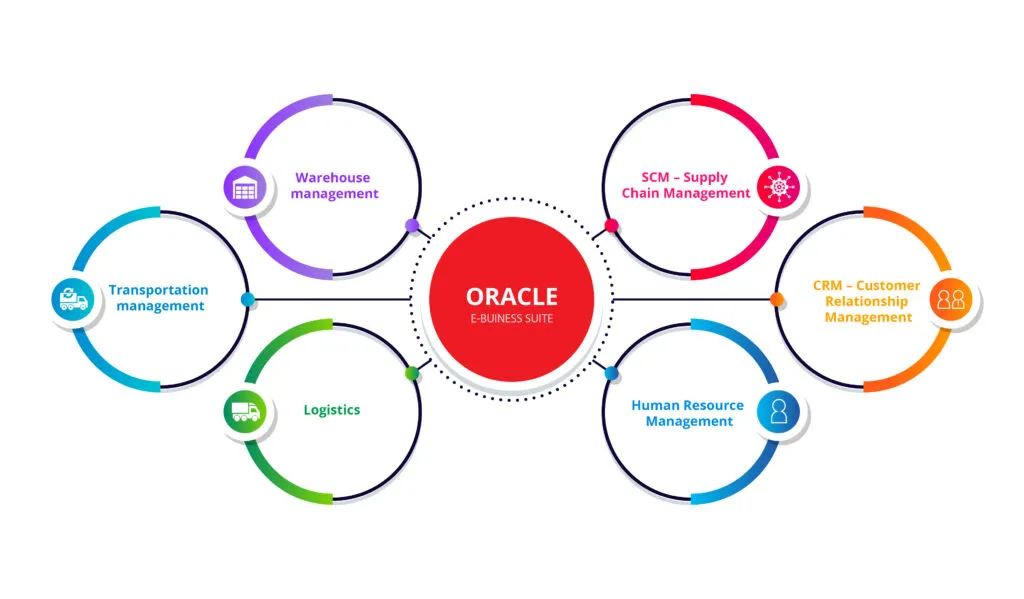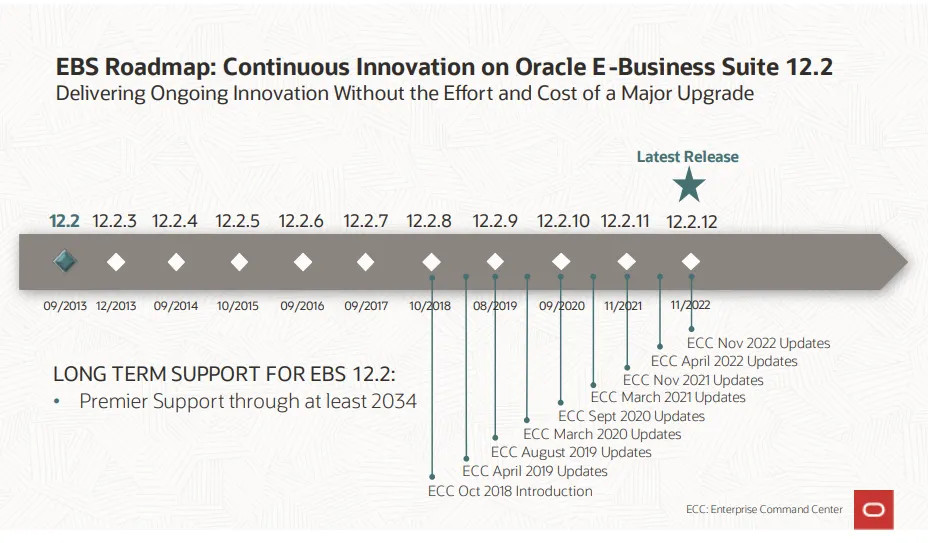
The future of Oracle EBS (Oracle E-Business Suite) has become a major discussion point among enterprises worldwide. Oracle EBS has been the most popular software across thousands of organizations for years, and even today, these organizations rely on it to run their business operations. A common question that arises is—will Oracle continue to support the current version of the Oracle E-Business Suite in the future, and if so, for how long? This concern exists because companies have invested substantial time and money in implementing Oracle EBS and are now curious about its future direction.
The good news is that Oracle has assured continued support for Oracle E-Business Suite until 2034, ensuring long-term stability and innovation. This demonstrates Oracle’s commitment to the future of Oracle EBS, helping organizations continue to succeed in the marketplace. This blog provides insights into Oracle’s roadmap, ongoing support, and how it affects business operations.
In March 2023, Oracle announced its roadmap for E-Business Suite 12.2, emphasizing continuous innovation and premier support until 2034 — a significant step in securing the future of Oracle EBS.
Oracle E-Business Suite is a comprehensive software suite that helps enterprises manage all their operations using a unified database. This integration streamlines processes, enhances data accuracy, and minimizes system complexity.

Since its first release in 2007, Oracle EBS has evolved continuously to meet current business and technology needs. The latest version, 12.2, represents Oracle’s commitment to modernization and the future of Oracle EBS.
Oracle’s continuous innovation and premier support for Oracle EBS 12.2 until 2034 align it with other applications such as Hyperion, JD Edwards EnterpriseOne, PeopleSoft, and Siebel CRM — all of which also offer long-term support. This consistent strategy reinforces Oracle’s promise to secure the future of Oracle EBS and provide stability across its suite of enterprise applications.
Oracle’s investment in the future of Oracle EBS focuses on three primary areas:

Oracle also helps EBS customers leverage SaaS integrations through Oracle EBS Cloud vs. On-Premises models. This allows seamless integration with Oracle SaaS products like Accounting Hub Reporting Cloud Service, Revenue Management Cloud Service, and In-Memory Cost Management Cloud Service — bringing cloud capabilities to existing EBS systems.
Additionally, Oracle invests heavily in automation to help customers transition portions of their environments to Oracle SCM Cloud, enabling hybrid operations while maintaining EBS functionality.
Customers can expect ongoing improvements from Oracle E-Business Suite 12.2’s Continuous Innovation strategy, supporting the future of Oracle EBS with:

According to Gartner’s Market Guide, cloud migration requires deep expertise and clear strategy. Enterprises with on-premises setups often question Oracle’s long-term approach to Oracle EBS Cloud vs. On-Premises models. While Oracle ERP Cloud is evolving, many organizations still rely on EBS due to customization, maturity, and reliability.
Some CIOs prefer to wait for Oracle SCM Cloud and other modules to mature before transitioning. The debate between cloud and on-premise continues, but Oracle’s commitment to premier support beyond 2030 ensures flexibility for every business.
Oracle’s investments also include user-friendly HTML interfaces, Oracle EBS best practices, and Analyzer Scripts like Inbound Transactions Analyzer for proactive issue management.
Many enterprises initially moved to the cloud for modernization, but data sensitivity and mission-critical policies keep many EBS systems on-premise. Oracle’s coexistence model allows gradual integration with cloud apps, aligning with Oracle EBS best practices for modernization while maintaining security and control.
Though full migration to Fusion Cloud can be complex, Oracle introduced Oracle Soar in 2018 to simplify and reduce migration costs for EBS users, ensuring a smoother transition path in the future of Oracle EBS.
“Future of Oracle E-Business Suite holds good.”
Taking all these factors into account, the future of Oracle EBS remains strong. Oracle continues to enhance E-Business Suite with new features, ensuring premier support until 2034 and beyond. Businesses can plan confidently by aligning with Oracle’s roadmap and modernization strategy.
At Propel Apps, we help organizations align their objectives with Oracle’s evolving ecosystem. Discover how Oracle SCM Cloud can enhance your business performance and how our mobile supply chain solutions can accelerate your digital transformation. Contact us today to make informed decisions and drive your business growth.